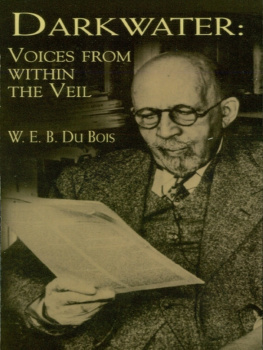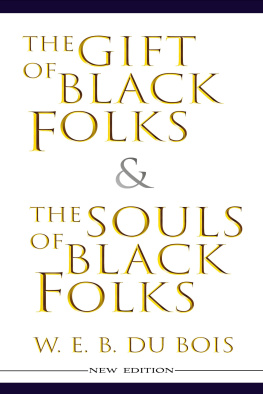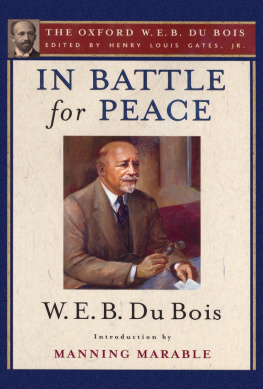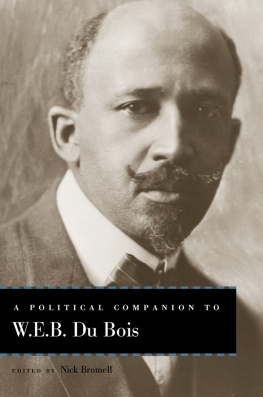W. E. B. Du Bois - The Conservation of Races
Here you can read online W. E. B. Du Bois - The Conservation of Races full text of the book (entire story) in english for free. Download pdf and epub, get meaning, cover and reviews about this ebook. genre: Romance novel. Description of the work, (preface) as well as reviews are available. Best literature library LitArk.com created for fans of good reading and offers a wide selection of genres:
Romance novel
Science fiction
Adventure
Detective
Science
History
Home and family
Prose
Art
Politics
Computer
Non-fiction
Religion
Business
Children
Humor
Choose a favorite category and find really read worthwhile books. Enjoy immersion in the world of imagination, feel the emotions of the characters or learn something new for yourself, make an fascinating discovery.
- Book:The Conservation of Races
- Author:
- Genre:
- Rating:4 / 5
- Favourites:Add to favourites
- Your mark:
- 80
- 1
- 2
- 3
- 4
- 5
The Conservation of Races: summary, description and annotation
We offer to read an annotation, description, summary or preface (depends on what the author of the book "The Conservation of Races" wrote himself). If you haven't found the necessary information about the book — write in the comments, we will try to find it.
The Conservation of Races — read online for free the complete book (whole text) full work
Below is the text of the book, divided by pages. System saving the place of the last page read, allows you to conveniently read the book "The Conservation of Races" online for free, without having to search again every time where you left off. Put a bookmark, and you can go to the page where you finished reading at any time.
Font size:
Interval:
Bookmark:
The Project Gutenberg EBook of The Conservation of Racesby W.E. Burghardt Du Bois(#2 in our series by W.E. Burghardt Du Bois)
Copyright laws are changing all over the world. Be sure to check thecopyright laws for your country before downloading or redistributingthis or any other Project Gutenberg eBook.
This header should be the first thing seen when viewing this ProjectGutenberg file. Please do not remove it. Do not change or edit theheader without written permission.
Please read the "legal small print," and other information about theeBook and Project Gutenberg at the bottom of this file. Included isimportant information about your specific rights and restrictions inhow the file may be used. You can also find out about how to make adonation to Project Gutenberg, and how to get involved.
**Welcome To The World of Free Plain Vanilla Electronic Texts**
**eBooks Readable By Both Humans and By Computers, Since 1971**
*****These eBooks Were Prepared By Thousands of Volunteers!*****
Title: The Conservation of Races
Author: W.E. Burghardt Du Bois
Release Date: May, 2004 [EBook #5685][Yes, we are more than one year ahead of schedule][This file was first posted on August 7, 2002]
Edition: 10
Language: English
*** START OF THE PROJECT GUTENBERG EBOOK, THE CONSERVATION OF RACES ***
This eBook was produced by Stephanie McNees.
The American Negro Academy Occasional Papers, No. 2
THE CONSERVATION OF RACES
W.E. Burghardt Du Bois
1897
Announcement
The American Negro Academy believes that upon those of therace who have had the advantage of higher education and culture,rests the responsibility of taking concerted steps for theemployment of these agencies to uplift the race to higher planesof thought and action.
Two great obstacles to this consummation are apparent: (a)The lack of unity, want of harmony, absence of a self-sacrificing spirit, and no well-defined line of policy seekingdefinite aims; and (b) The persistent, relentless, at timescovert opposition employed to thwart the Negro at every step ofhis upward struggles to establish the justness of his claim tothe highest physical, intellectual and moral possibilities.
The Academy will, therefore, from time to time, publishsuch papers as in their judgment aid, by their broad andscholarly treatment of the topics discussed the dissemination ofprinciples tending to the growth and development of the Negroalong right lines, and the vindication of that race againstvicious assaults.
The American Negro has always felt an intense personalinterest in discussions as to the origins and destinies ofraces: primarily because back of most discussions of race withwhich he is familiar, have lurked certain assumptions as to hisnatural abilities, as to his political , intellectual and moralstatus, which he felt were wrong. He has, consequently, been ledto deprecate and minimize race distinctions, to believeintensely that out of one blood God created all nations, and tospeak of human brotherhood as though it were the possibility ofan already dawning to-morrow.
Nevertheless, in our calmer moments we must acknowledgethat human beings are divided into races; that in this countrythe two most extreme types of the world's races have met, andthe resulting problem as to the future relations of these typesis not only of intense and living interest to us, but forms anepoch in the history of mankind.
It is necessary, therefore, in planning our movements, inguiding our future development, that at times we rise above thepressing, but smaller questions of separate schools and cars,wage-discrimination and lynch law, to survey the whole questionsof race in human philosophy and to lay, on a basis of broadknowledge and careful insight, those large lines of policy andhigher ideals which may form our guiding lines and boundaries inthe practical difficulties of every day. For it is certain thatall human striving must recognize the hard limits of naturallaw, and that any striving, no matter how intense and earnest,which is against the constitution of the world, is vain. Thequestion, then, which we must seriously consider is this: Whatis the real meaning of Race; what has, in the past, been the lawof race development, and what lessons has the past history ofrace development to teach the rising Negro people?
When we thus come to inquire into the essential differenceof races we find it hard to come at once to any definiteconclusion. Many criteria of race differences have in the pastbeen proposed, as color, hair, cranial measurements andlanguage. And manifestly, in each of these respects, humanbeings differ widely. They vary in color, for instance, from themarble-like pallor of the Scandinavian to the rich, dark brownof the Zulu, passing by the creamy Slav, the yellow Chinese, thelight brown Sicilian and the brown Egyptian. Men vary, too, inthe texture of hair from the obstinately straight hair of theChinese to the obstinately tufted and frizzled hair of theBushman. In measurement of heads, again, men vary; from thebroad-headed Tartar to the medium-headed European and thenarrow-headed Hottentot; or, again in language, from the highly-inflected Roman tongue to the monosyllabic Chinese. All thesephysical characteristics are patent enough, and if they agreedwith each other it would be very easy to classify mankind.Unfortunately for scientists, however, these criteria of raceare most exasperatingly intermingled. Color does not agree withtexture of hair, for many of the dark races have straight hair;nor does color agree with the breadth of the head, for theyellow Tartar has a broader head than the German; nor, again,has the science of language as yet succeeded in clearing up therelative authority of these various and contradictory criteria.The final word of science, so far, is that we have at least two,perhaps three, great families of human beingsthe whites andNegroes, possibly the yellow race. That other races have arisenfrom the intermingling of the blood of these two. This broaddivision of the world's races which men like Huxley and Raetzelhave introduced as more nearly true than the old five-racescheme of Blumenbach, is nothing more than an acknowledgmentthat, so far as purely physical characteristics are concerned,the differences between men do not explain all the differencesof their history. It declares, as Darwin himself said, thatgreat as is the physical unlikeness of the various races of mentheir likenesses are greater, and upon this rests the wholescientific doctrine of Human Brotherhood.
Although the wonderful developments of human history teachthat the grosser physical differences of color, hair and bone gobut a short way toward explaining the different roles whichgroups of men have played in Human Progress, yet there aredifferencessubtle, delicate and elusive, though they may bewhich have silently but definitely separated men into groups.While these subtle forces have generally followed the naturalcleavage of common blood, descent and physical peculiarities,they have at other times swept across and ignored these. At alltimes, however, they have divided human beings into races,which, while they perhaps transcend scientific definition,nevertheless, are clearly defined to the eye of the Historianand Sociologist.
If this be true, then the history of the world is thehistory, not of individuals, but of groups, not of nations, butof races, and he who ignores or seeks to override the race ideain human history ignores and overrides the central thought ofall history. What, then, is a race? It is a vast family of humanbeings, generally of common blood and language, always of commonhistory, traditions and impulses, who are both voluntarily andinvoluntarily striving together for the accomplishment ofcertain more or less vividly conceived ideals of life.
Turning to real history, there can be no doubt, first, asto the widespread, nay, universal, prevalence of the race idea,the race spirit, the race ideal, and as to its efficiency as thevastest and most ingenious invention of human progress. We, whohave been reared and trained under the individualisticphilosophy of the Declaration of Independence and the laisser-faire philosophy of Adam Smith, are loath to see and loath toacknowledge this patent fact of human history. We see thePharaohs, Caesars, Toussaints and Napoleons of history andforget the vast races of which they were but epitomizedexpressions. We are apt to think in our American impatience,that while it may have been true in the past that closed racegroups made history, that here in conglomerate America NOUSAVONS CHANGER TOUT CELAwe have changed all that, and have noneed of this ancient instrument of progress. This assumption ofwhich the Negro people are especially fond, can not beestablished by a careful consideration of history.
Next pageFont size:
Interval:
Bookmark:
Similar books «The Conservation of Races»
Look at similar books to The Conservation of Races. We have selected literature similar in name and meaning in the hope of providing readers with more options to find new, interesting, not yet read works.
Discussion, reviews of the book The Conservation of Races and just readers' own opinions. Leave your comments, write what you think about the work, its meaning or the main characters. Specify what exactly you liked and what you didn't like, and why you think so.











